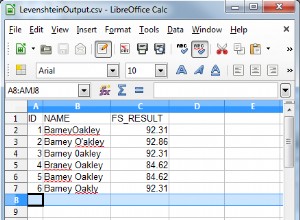Acho que o seguinte faz o que você quer:
SELECT *, (To_days(date_expires)-TO_DAYS(NOW())) as dayDiff, COUNT(id) AS change_count
FROM mytable
GROUP BY (case when source_id is null then id else source_id end)
HAVING dayDiff < 4
ORDER BY (case when source_id is null then 1 else 0 end), date_created DESC
Faz um
group by condicional então os sourceids NULL não serão agrupados. Em seguida, ele os coloca por último usando a lógica em order by . Não entendi o que você quis dizer com última ocorrência. Agora acho que sim:
SELECT coalesce(s.id, mytable.id) as id,
max(case when s.maxid is not null and s.maxid = myable.id then mytable.name
when s.maxid is null then NULL
else mytable.name
end) as name,
(To_days(date_expires)-TO_DAYS(NOW())) as dayDiff, COUNT(id) AS change_count
FROM mytable left outer join
(select source_id, MAX(id) as maxid
from mytable
where source_id is not null
group by source_id
) s
on mytable.id = s.maxid
GROUP BY (case when source_id is null then id else source_id end)
HAVING dayDiff < 4
ORDER BY (case when source_id is null then 1 else 0 end), date_created DESC
Isso une as informações do registro mais recente (com base no id mais alto).




